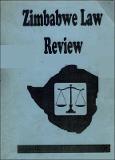| dc.contributor.author | Kabeberi-Macharia, Janet | |
| dc.contributor.author | Nyamu, Celestine | |
| dc.coverage.spatial | Kenya | en |
| dc.date.accessioned | 2015-08-14T11:52:13Z | |
| dc.date.available | 2015-08-14T11:52:13Z | |
| dc.date.issued | 1997 | |
| dc.identifier.citation | Kabeberi-Macharia, J. and Nyamu, C. (1997) Marriage by Affidavit: Developing Alternative Laws on Cohabitation in Kenya. Zimbabwe Law Review (ZLRev.) vol. 14, (pp.46-54). UZ, Mt. Pleasant, Harare: Faculty of Law (UZ) | en |
| dc.identifier.uri | https://opendocs.ids.ac.uk/opendocs/handle/20.500.12413/6741 | |
| dc.description | A ZLRev. article on alternative marriage arrangements as well as their impact on family law in Kenya. | en |
| dc.description.abstract | Cohabitation unions are on the increase in Kenya more so due to the breakdown of the family unit as a result of increased urbanization and rural-urban migration. More often than not, those entering into cohabitation unions have no intention of regularizing the union. In justifying the relationship, many sign affidavits which are renewable once a year. This practice has become so widespread that it needs to be officially acknowledged as an official form of marriage. This emergent form of marriage is "neither custom or law" (to borrow the term from Martin Chanock), and we refer to it in this paper as "marriage by affidavit". The use of affidavits to validate a cohabitation union stemmed from nonrecognition of customary law marriages by statutory law. This has been taken up by other couples who cohabit as man and wife, but do not want to undergo either a customary or civil ceremony, but at the same time want to enjoy the same "benefits" as those who have undergone either of the ceremonies.
This paper analyses the increased incidence of marriage by affidavit as an alternative way of getting married and the implication of these types of unions on Kenya's family law. In so doing the paper focuses on the situation of cohabitation outside marriage; the judicial interpretation of cohabitation unions for purposes of determining the existence of a marriage. It is in the process of determining the existence of a marriage that courts are faced with the issue of the validity of affidavits sworn by the parties stating that they are married. For purposes of this paper, reported cases and complaints were collected from the High Court of Kenya, FIDA(K) and university libraries. The purpose of this exercise was to investigate the magnitude of the incidence of cohabitation marriages, the attempts at legalizing the unions and at what stage these attempts were made. The paper concludes that cohabitation unions or marriages by affidavit can no longer be ignored by family law systems as more and more couples are preferring to enter into this type of union. Thus the available court cases are only a tip of the iceberg. The Marriage Bill should therefore enact specific law to regulate the unions. | en |
| dc.language.iso | en | en |
| dc.publisher | Faculty of Law, University of Zimbabwe (UZ) | en |
| dc.rights.uri | http://creativecommons.org/licenses/by-nc-nd/3.0/ | en |
| dc.subject | Rights | en |
| dc.subject | Sexuality and Development | en |
| dc.subject | Social Protection | en |
| dc.title | Marriage by Affidavit: Developing Alternative Laws on Cohabitation in Kenya | en |
| dc.type | Article | en |
| dc.rights.holder | University of Zimbabwe (UZ) | en |


